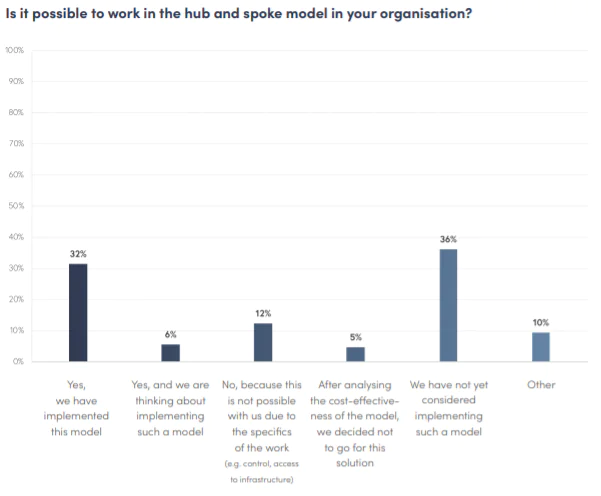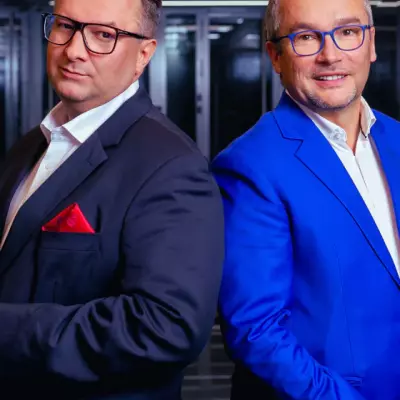Satellite offices are a convenience for employees and a boost to development for medium-sized cities
According to the report of Antal and Corees Polska "Work model - employee performance and satisfaction" one in three companies already operates in the hub & spoke model. The idea itself is not new – but the management changes resulting from the Covid-19 pandemic have significantly accelerated its implementation in many organisations. In addition, it not only reduces the operating costs of companies, but also strongly stimulates the development of regional cities, driving the local economy and the labour market.
This year's Antal and Corees report describes the approach of companies to the increasingly popular hub & spoke model in the west. Its origins stem from the layout of airports based on the central junction of connections to many smaller airports. This provides a more efficient transport system. Today, this model is increasingly used in the efficient planning of office spaces and the placement of employees. Hub & spoke in this context means a situation in which a company has its headquarters (hub) and at the same time operates from a minimum of two satellite offices (spokes).
Popularizing the hub & spoke model
Satellite offices are traditionally smaller locations that are often designed to meet the needs of a single team or department. They can be suitable for regional sales, marketing, or focus on specific features – such as customer service or special projects. They are more employee-friendly as they are located in places closer to their homes, which reduces commuting time. They also offer spaces where you can find silence, as well as collaborative rooms where teams can meet to generate ideas and plan. 32% of the organizations surveyed by Antal and Corees Polska already work in such a model, and another 12% plan to implement it. However, 36% of companies have not yet considered such an option.
Hub & spoke is a workplace-based approach where activity is the basis. Once, the whole company was in one location, now especially after changes in the organization of work related to the Covid-19 pandemic, is scattered. For example, you stay at home if you need to prepare a report; you go to the headquarters to work with the team; you go to the satellite office near the house to perform other activities requiring access to office infrastructure, which is difficult to provide at home - comments Marek Ciunowicz, CEO at Corees Polska.

The high strength of smaller cities
Most often, hub & spoke is based on branches located in the largest urban centers (43% of indications). Large agglomerations, which include m.in. Warsaw, Cracow, Wroclaw and Tricity are known and appreciated both by companies already present on the domestic market and by investors planning to locate new branches in Poland. However, already 38% of satellite offices are located in medium-sized cities such as Opole, Rzeszów, Białystok or Radom This allows us to achieve benefits not only in the employee-employer dimension, but on the economic scale of the whole region.
The success of Poland as an attractive place for business development is largely related to the human factor - i.e. the presence on the market of highly qualified specialists and managers. The problem arises, however, when competition among employers intensifies and there is a shortage of staff - notes Artur Skiba, CEO of Antal. Smaller cities come here, which can provide valuable human capital with strong academic background - adds Skiba.
In Opole we have about 19,000 students. Thanks to substantive cooperation with academia, 5.5 thousand graduates with above-average knowledge of foreign languages – mainly German – enter the labour market every year. What employers appreciate is also the high ethos of work and entrepreneurship of the inhabitants - emphasizes Maciej Wujec, Vice President of Opole.
From a strictly business perspective, the upside is also, of course, lower operating costs in these cities. Less staff turnover is also a tangible gain for the organization.
The hub and spoke model is one potential strategy that real estate managers are looking at to offer their colleagues more choice. That is the quality that we will see more than any other as the return to the office takes place - workers want to work in a location of their choosing and at a time that is right for them. Real estate has never been geared to provide multiple options for workers and providing this level of choice will be a real challenge. But being able to provide more localised access to the office and reduce the financial and time considerations of a long commute to work is a factor that we have heard again and again from clients we have surveyed. And the employers that want to compete for the best talent will have work hard to offer this level of choice. – notes John Duckworth, Managing Director – UK & EMEA – The Instant Group.
In view of the approach to the issue of business activity in regional cities, it is worth considering that interest in new investments as well as reinvestment in Poland is not decreasing.
Poland has a well-established position of attractive location for outsourcing business. Until now, mainly the largest cities have benefited from this fact. The trend of hybrid work has led more and more companies to think about hiring staff living in medium-sized centres, where we estimate that around 100,000 skilled workers are available. A favourable view of smaller cities will allow companies to recruit staff without having to participate in the so-called "talent war" in Krakow or Wrocław. – sums up Grzegorz Kmieciński, Director, Tenant Representation at Corees Polska.
















